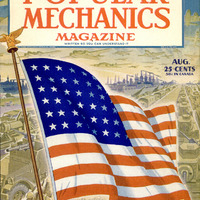Steam From Bread Harnessed To Make Alcohol for Fuel
Item
- Title (Dublin Core)
- Steam From Bread Harnessed To Make Alcohol for Fuel
- Article Title and/or Image Caption (Dublin Core)
- Steam From Bread Harnessed To Make Alcohol for Fuel
- Language (Dublin Core)
- Eng
- Temporal Coverage (Dublin Core)
- World War II
- Date Issued (Dublin Core)
- 1942-08
- Is Part Of (Dublin Core)
-
 Popular Mechanics, vol. 78, n. 2, 1942
Popular Mechanics, vol. 78, n. 2, 1942
- pages (Bibliographic Ontology)
- 96
- Rights (Dublin Core)
- Public domain
- Source (Dublin Core)
- Google books
- References (Dublin Core)
- Honeywell UOP
- Chicago
- Sweden
- France
- Spain
- Holland
- Paris
- Russia
- Germany
- Europe
- Archived by (Dublin Core)
- Enrico Saonara

